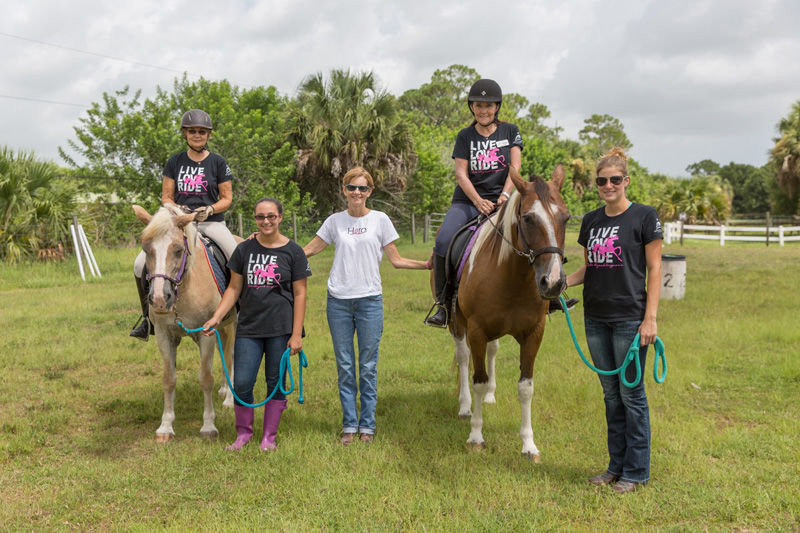Run by a small group of dedicated breast cancer survivors, the support group Friends After Diagnosis continues to broaden its reach to meet the unique physical and mental challenges associated with the disease.
The group was founded in 2010 by board chairman Lin Reading, now a 15-year survivor and a Certified Cancer Navigator. Reading and husband Larry Macke, a medical writer with inVentiv Health Clinical, moved to Vero Beach eight years ago to be closer to her parents, who had a home at The Moorings for 35 years. Her mother, who passed away four years ago, was fighting a second occurrence of breast cancer at the time.
“I had had cancer five years before moving here and knew the difficulties associated with it,” said Reading. Her father passed away recently and, while he never had cancer, his three sisters had breast or ovarian cancer as did numerous cousins on his side of the family.
To lighten her mother’s depression, Reading called the American Cancer Society to find a volunteer job they could do together. They suggested she start a support group.
“Coincidentally, the same week that I talked to the American Cancer Society, there were several other women who had decided that they were in dire need of a support group for cancer in Vero Beach,” says Reading, referencing Fran Basso, Maureen Walker and Tammy Blackwell.
They began meeting twice a month to share experiences and eventually incorporated monthly guest speakers on a wide variety of topics.
“One of my goals is to let breast cancer survivors know that there is a wealth of resources available to them in the area.”
An upcoming speaker will talk about creating a comfortable space at home for people with chronic illness.
“And I look upon breast cancer as a chronic illness. As much as people would like to think that after radiation and chemotherapy you’re back to normal, you truly never are. You’re a changed person. Not only dealing with the side effects of different medications for the rest of your life, but dealing with things like your annual and bi-annual checkups and monographies. The fear … a little bit of that fear never leaves people with cancer.”
Their primary focus is breast cancer, but they have a close relationship with the Treasure Coast Ovarian Cancer Alliance.
“Quite honestly, we won’t turn anyone away,” says Reading, adding that everyone is invited to hear their guest speakers.
Wanting to also incorporate activities, they formed partnerships with the Center for Spiritual Care, which offers a variety of programs and S.T.A.R. Pilates, which offers a Pink Ribbon Pilates Program. They also participate with ACS events and programs.
“Any of the classes that I offer are always free to survivors; there is never any cost to them,” says Reading. “Gini [Murphy] gives of her time and her space twice a month for this incredible Pilates class. And this class is open to any breast cancer survivors in the community; they don’t have to come through the group. It’s specifically designed for breast cancer survivors. It helps get range of motion back and works on self-esteem, because breast cancer is one of those cancers that shows openly for some survivors.”
Their newest partnership is Ride Beyond Diagnosis through Special Equestrians of the Treasure Coast, which provides equestrian therapy to improve mental, physical or emotional disabilities.
They had one eight-week class in the spring and have others planned for the fall and in January. Led by Darlene Dennis, a certified instructor, the gentle horses help to heal mind, body and soul.
Survivors interact, groom and ride the horses, but Reading explains, “Throughout all of this it’s not just going through the mechanics of horseback riding. It’s equestrian therapy, so there’s a lot of talking and sharing of feelings. All sorts of things go on, from horse hugging to keeping a journal of your experiences. And once again, similar to the Pilates class, building self-esteem, a sense of accomplishment and posture, which is so important to women and men with breast cancer.”
The group now hosts meetings the second and fourth Mondays and the third Saturday of the month at First Presbyterian Church and the first Saturday at Sebastian River Medical Center, with anywhere from five to 35 people attending.
“I suggest that new people might want to come to a small meeting first. Sharing your story for the first time can be difficult. But when you get 30 we have lots of fun. It is a very close sisterhood. Whether it’s your first time or you’ve been coming since the very first meeting, we know that we have a bond with each other.”
They also distribute gently used or new prosthesis, often to women without health insurance who haven’t the means to purchase them. “I would love for every woman who has breast cancer to have a brand new prosthesis. That certainly is a goal of mine,” says Reading.
While expenses are relatively low, so is funding, which primarily comes from individuals, honorariums and small fundraisers. “So far we’ve been able to keep going,” says Reading. “I wish more people in the community would donate; we do a lot for the community.”
For more information, visit friendsafterdiagnosis.com.

